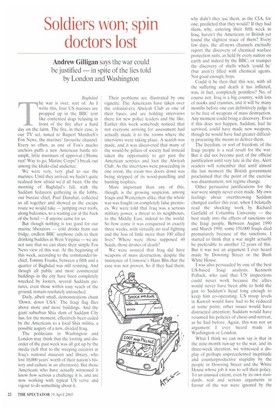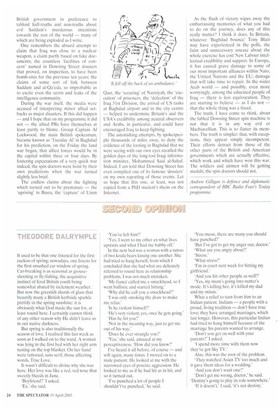Soldiers won; spin doctors lost
Andrew Gilligan says the war could be justified — in spite of the lies told by London and Washington
Baghdad
T. he war is over, sort of. As I write this, four US marines are propped up in the BBC tent like contented dogs relaxing in front of the fire after a hard day on the farm. The fire, in their case, is our TV set, tuned to Rupert Murdoch's Fox News, the marines' favourite channel. Every so often, as one of Fox's macho anchors puffs a new American battle triumph, little murmurs of approval ('Home run! Way to go, Marine Corps!') break out among the khaki-clad audience.
We were very, very glad to see the marines. Until they arrived, we hadn't quite realised how afraid we'd all been. On the morning of Baghdad's fall, with the Saddam fedayeen gathering in the lobby, our bureau chief. Paul Danahar, collected us all together and showed us the escape route we would take — jumping over roofs, along balconies, to a waiting car at the back of the hotel — if anyone came for us.
But though nothing is too good for our marine liberators — cold drinks from our fridge, endless BBC satphone calls to their drinking buddies in West Virginia — we are not sure that we can share their simple Fox News view of this war_ At the beginning of this week, according to the commander-inchief, Tommy Franks, between a fifth and a quarter of Baghdad was still resisting. And though all public and most commercial buildings in the city have been completely wrecked by looters, several Saddam pictures, even those within easy reach of the ground, remain resolutely untouched.
Daily, albeit small, demonstrations chant 'Down, down USA'. The Iraqi flag flies above more and more buildings. And the giant suburban Shia slum of Saddam City has, for the moment, effectively been ceded by the Americans to a local Shia militia, a possible augury of a new, divided Iraq.
The politicians in Washington and London may think that the looting and disorder of the past week was all got up by the media (tell that to the weeping curators at Iraq's national museum and library, who lost 10,000 years worth of their nation's history and culture in an afternoon). But those Americans who have actually witnessed it know how serious a challenge it is, and are now working with typical US verve and vigour to do something about it.
Their problems are illustrated by one vignette. The Americans have taken over the colonial-era Alwiyah Club as one of their bases, and are holding interviews there for new police leaders and the like. Earlier this week somebody noticed that not everyone arriving for assessment had actually made it to the rooms where the interviews were taking place. A search was made, and it was discovered that many of the would-be pillars of society had instead taken the opportunity to get past the American sentries and loot the Alwiyah Club. As the interviews were proceeding in one room, the room two doors down was being stripped of its wood-panelling and hunting trophies.
More important than any of this, though, is the growing suspicion, among Iraqis and Westerners alike, that the whole war was fought on completely false premises. We were told that Iraq was a serious military power, a threat to its neighbours, to the Middle East, indeed to the world. So how come it was conquered in exactly three weeks, with virtually no real fighting and the loss of little more than 100 allied lives? Where were those supposed 40 Scuds, those drones of death?
We were assured that Iraq did have weapons of mass destruction, despite the insistence of Unmovic's Hans Blix that the case was not proven. So if they had them,
why didn't they use them, as the CIA, for one, predicted that they would? If they had them, why, entering their fifth week in Iraq, haven't the Americans or British yet found the slightest trace of them? Every few days, the all-news channels excitedly report the discovery of chemical warfare protection suits, as held by every nation on earth and indeed by the BBC; or trumpet the discovery of shells which 'could be' (but aren't) filled with chemical agents. Not good enough, boys.
Could it be then that this war, with all the suffering and death it has inflicted, was, in fact, completely pointless? No, of course not. Iraq is a big country, with lots of nooks and crannies, and it will be many months before one can definitively judge it to be free of weapons of mass destruction. Any moment could bring a discovery. Even if this does not happen, Saddam, had he survived, could have made new weapons, though he would have had greater difficulty procuring the means to deliver them.
The freedom, or sort of freedom, of the Iraqi people is a real result for the war. But it did not become part of the official justification until very late in the day. Alert readers will remember that until almost the last moment the British government proclaimed that the point of the exercise was disarmament, not regime change.
Other persuasive justifications for the war were simply never even made. My own feelings about overthrowing Saddam changed earlier this year, when I belatedly read the shocking work by Richard Garfield of Columbia University — the best study into the effects of sanctions on the Iraqi people. Between August 1990 and March 1998, some 150,000 Iraqis died prematurely because of the sanctions. I started to think that a war might actually be preferable to another 12 years of this. But it was not an argument I ever heard made by Downing Street or the Bush White House.
I was also persuaded by one of the best US-based Iraqi analysts. Kenneth Pollack, who said that UN inspections could never work because the allies would never have been able to hold the gun to Saddam's head long enough to keep him co-operating. US troop levels in Kuwait would have had to be reduced at some point; other issues would have distracted attention; Saddam would have resumed his policies of cheat-and-retreat, as he had before. Again, this was not an argument I ever heard made in Washington or London.
What I think we can now say is that in the nine-month run-up to the war, and its three-week duration, we witnessed a display of perhaps unprecedented ineptitude and counterproductive stupidity by the people in Downing Street and the White House whose job it was to sell their policy. To an unusual extent, even by its own standards, real and serious arguments in favour of the war were ignored by the British government in preference to tabloid half-truths and non-truths about evil Saddam's murderous intentions towards the rest of the world — many of which are being exploded as I write, One remembers the absurd attempt to claim that Iraq was close to a nuclear weapon, a claim partly based on fake documents; the countless 'facilities of concern' named in Downing Street dossiers that proved, on inspection, to have been bomb-sites for the previous ten years; the claims of some sort of link between Saddam and al-Qa'eda, so improbable as to excite even the scorn and leaks of the intelligence community.
During the war itself, the media were accused of interpreting minor allied setbacks as major disasters. If this did happen — and I hope that on my programme it did not — the allied PRs have themselves at least partly to blame. Group Captain Al Lockwood, the main British spokesman, became known as 'Tuesday Al' in Baghdad for his prediction, on the Friday the land war began, that allied forces would be in the capital within three or four days. By fostering expectations of a very quick war indeed, the spin doctors were hoist by their own predictions when the war turned slightly less brief.
The endless claims about the fighting which turned out to be premature — the 'uprising' in Basra, the 'capture' of Umm Qasr, the 'securing' of Nasiriyah, the 'execution' of prisoners. the 'defection' of the Iraq 51st Division, the arrival of US tanks at Baghdad airport and in the city centre — helped to undermine Britain's and the USA's credibility among neutral observers and Arabs, in particular, and could have encouraged Iraq to keep fighting.
The astonishing attempts, by spokespeople thousands of miles away, to deny the evidence of the looting in Baghdad that we were seeing with our own eyes recalled the golden days of the long-lost Iraqi information minister, Mohammed Said al-Sahaf. Indeed, I am told that Downing Street has even compiled one of its famous 'dossiers' on my own reporting of those events, Let us hope that this one, at least, was not copied from a PhD student's thesis on the Internet. As the flush of victory wipes away the embarrassing memories of what you had to do on the journey, does any of this really matter? I think it does. In Britain, whatever 'Baghdad bounce' Tony Blair may have experienced in the polls, the faint and unnecessary unease about the whole exercise has cost New Labour intellectual credibility and support. In Europe, it has caused grave damage to some of our most important alliances within Nato, the United Nations and the EU: damage that will take time to repair. In the wider Arab world — and possibly, even more worryingly, among the educated people of Iraq — there is less equivocation. They are starting to believe — as I do not — that the whole thing was a fraud.
The truth, I have come to think, about the fabled Downing Street spin machine is not that it is in any way evil or Machiavellian. This is to flatter its members. The truth is simpler: that, with exceptions, they appear simply incompetent. Their efforts detract from those of the other parts of the British and American governments which are actually effective, which work and which have won this war. The soldiers and airmen will be getting medals; the spin doctors should not.
Andrew Gilligan is defence and diplomatic correspondent of BBC Radio Four's Today programme.



































































 Previous page
Previous page